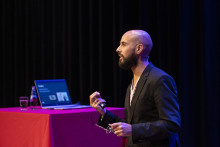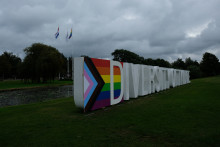A mere few dozen staff members and students found their way to the Amphitheatre - and thus to Amghar's talk on equity. He began with an anecdote about unconscious bias, about having finished the Amsterdam marathon in a totally respectable time of two hours and 52 minutes. 'I got into a conversation with someone about 60 years old and proudly told him I had run a PR. Out of respect, I asked how many hours it had taken him to finish. Two hours and 41 minutes was his answer. Talk about falling off my high horse.'
Unconscious biases and stereotypes
His point: everyone has unconscious biases. He went on to discuss those - and their influence on our view of humanity and the world - together with the audience. About western Dutch people in ANWB clothes on ebikes who only offer one biscuit with their coffee, about Dutch people with Moroccan roots who ride scooters and steal, about emotional women who work part-time and are bad at math and non-crying men who work full-time and only pay attention to sports. All these clichéd stereotypes come from somewhere, Amghar argued.
All those prejudices are learned, he continued, pointing to the nature versus nurture debate. 'That's also why representation is so incredibly important. That you don't just see tall, white men as superheroes, doctors or CEOs. Many people say: diversity is not important. Just work hard and you'll get there. But it's much deeper than that. The fact that women earn less than men, or that there are fewer female professors in the Netherlands, is not because they do not work hard or are not smart enough. However, the cognitive dissonance is persistent.'
Equality of opportunities
But today, the TV maker did not want to talk so much about colour, race or gender, but about socio-economic status and equality of opportunities. 'That's why I'm still so angry to this day with the Central Bureau of Statistics when they once again come up with figures on crime among people of Moroccan or Turkish descent. That while sociologists have been concluding for decades that it is not so much the ethnic origin but rather the socio-economic status of someone that determines criminal behaviour.'
According to Amghar, upbringing and education have a key role in equal opportunities. And this is precisely where the Dutch education system falls short, he says. 'In this country, we have no less than seven different layers in secondary education, from practical education to vwo. While the differences between these layers are not that big at all. But our education system is too dependent on external factors and a person's socio-economic background is too decisive for where you end up in life.'

Diploma fetishism
He supported that view with facts, figures and examples: from a graph by the education inspectorate on over- and under-advising, to diploma fetishism and how the supply in supplementary lessons (bijlessen in Dutch, ed.) has increased tenfold over the past twenty years, and on how highly educated, wealthy parents can more easily coerce an over-advice for their child. 'It is a self-fulfilling prophecy, also the other way round. Financial poverty also fuels social and cultural poverty.'
With that, he reiterated the key role of education. 'I think we can broadly say that all good things today come from the good things in education. And the same applies vice versa: all the bad things also come from what has been taught wrongly. I believe that all the uproar we see, about corona, the farmer's protests, you name it, that it stems from inequality of opportunities.'
Amghar concluded his talk with a list of musings, advices and solutions: from having high expectations (the Rosenthal effect) to parental involvement ('read to your children before going to sleep'). For whether it is dealing with biases or upending education systems, his main message throughout the afternoon was: 'There is nothing so beautiful about human beings as our adaptability. Let us use that quality.'







